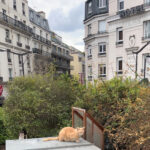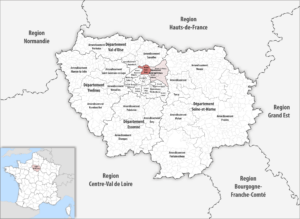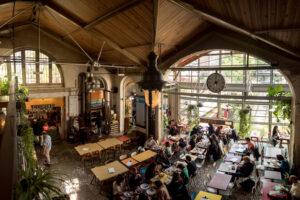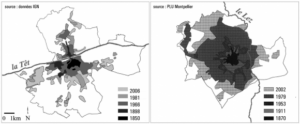
(Landon Davis, March 22, 2025)
On our first full-day in Paris we ventured to La Recyclerie in the northern suburb of Saint-Denis, a low-income area with a large immigrant population. It’s located within the remnants of an old railway station that was built in the 1870’s and closed in the 1950’s. La Recyclerie was founded in 2014, and it takes pride in it’s designation as a third place, which was described to us as a hub that offers a variety of activities. This specific third place emphasizes sustainability and ecological consciousness within their activities. We saw a workshop named René (reborn), which helps people fix personal belongings. There was also a rooftop garden centered on promoting biodiversity and honey cultivation (there was a particularly cute cat!). However, the main driver of success is undoubtedly their restaurant, which has a fully organic menu with vegan/vegetarian options always available.
While I do appreciate the sentiment behind La Recyclerie, and their commitment to environmental responsibility, I was highly concerned with their exclusivity. A majority of the social services (composting, fixing defective personal goods, etc.) are not accessible without a membership. Although the cost of entry is relatively low (€30 per year), it could still serve as a barrier that prevents local residents of Saint-Denis from utilizing La Recyclerie’s sustainable initiatives. This establishment also prides itself on the nutritious dining options that are undisputedly good for the environment. However, we were told that they charge a premium price to all meals, thus further alienating the low-income local inhabitants; however, there is a discount offered on meals if a membership is purchased. In my opinion, I find it unjust to require a membership to access the social services and discounts offered by La Recyclerie, and I find myself heavily questioning how this establishment benefits it’s community. I observed that the clientele did not feel representative of Saint-Denis at large; everyone there was young and chic, and the space felt like a bubble compared to the diverse demographics of the neighborhood.
Despite it’s progressive initiatives, La Recylerie faces significant economic challenges due to their status as a private entity. Our guide mentioned that the parent company of this establishment owns multiple cafes and restaurants in Paris centered on progressivism, he mentioned one that promoted feminist thought. Obviously I agree with these sentiments, however I do fully believe that using social issues as a form of marketing is wrong. I found La Recyclerie to, at it’s core, to be a trendy restaurant which uses the aesthetics surrounding sustainability as a branding tactic, thus commodifying ecological awareness. The services provided are only accessible to those who can afford it, and therefore excludes residents of the low-income community surrounding it.







